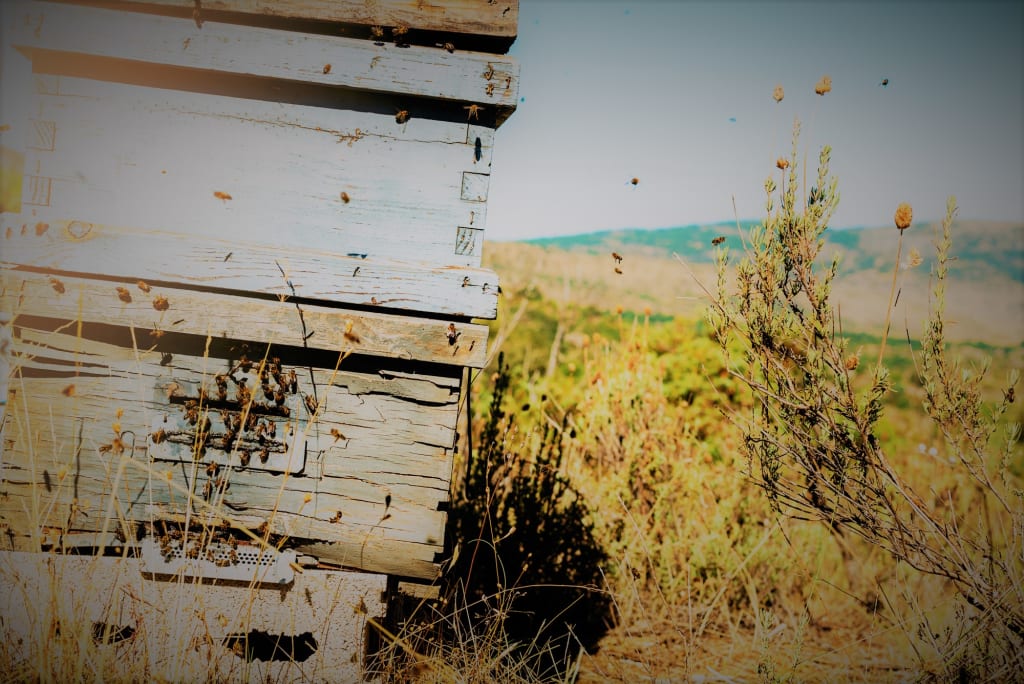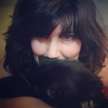The Healing Zen of Beekeeping
If you want to be near bees, you have to first find your quiet.

I got into beekeeping for one simple reason: bees scared the hell out of me.
At the time, I was 26 years into a 30-year abusive marriage. It wasn’t as much physical abuse as mental – although I certainly got pushed around enough. At that point it was enough for him to raise his hand threateningly. Like Pavlov’s dog, I’d been well conditioned to cower; there was no need for the follow through.
People still ask me why I stayed.
At the time, it was impossible to believe I could leave.
If you’ve never been subject to it, what psychological and emotional abuse does to you is incomprehensible. It literally physically alters your brain. You live in a constant state of flight or fight, only you can’t do either. The abuse was also financial and sexual. It was spiritual. And the whole time, because my husband told me so, I thought *I* was the problem – the taker, the lazy one, the cheat.
And I had five kids. With a 20-year blank spot on my resume (unless you counted stay-at-home, home-schooling mom), I didn’t see how I could possibly support them on my own. All of the family assets were in his name. All of the bills were in mine.
I did all the things a good wife was supposed to do. I cooked the meals, did the laundry, went to church. I gardened. I canned things. We had chickens. From the outside, as long as you didn’t look too closely, we were the perfect little suburban “country” family.
Except I was always that person who yelped and did that little dance of fear around flying insects. “Stop it,” my husband would say. “You’re embarrassing me.”
At the church picnic, I’d find a way to sit in the car with the baby. “He’s fussy.” At the park I knew to avoid the trash cans, because bees and things hung out wherever food and sticky things got deposited. If there was one thing I was an expert in, it was fear. I walked on eggshells every day at home; it was nothing to dance a path away from danger out of doors.
I really don’t know what made me pick up the book on beekeeping at the library. I don’t remember if it was sitting on the table with other put-aways when we got there or was maybe part of a “Save the Bees” display on an endcap. What I do remember was being so engrossed in the book that by the time Storytime ended and my littles were bounding back in my direction, I was hooked. I checked that book out along with three others.
Bees, I soon learned, were not the bad guys.
Most of the time, I’ve found, when people are stung by a bee what they really got stung by was a wasp, yellow jacket or hornet. Really, those are all assholes. In my opinion the online bee magazine beeculture.com said it perfectly. “Bees aren’t ‘seek and destroy’ insects. They really aren’t itching for a fight, and are quite content to ignore humans. After all, they have work to do. We’re basically a nuisance to them, so stinging is really a last resort for a bee.”
Becoming a beekeeper is not a cheap endeavor. There are the hives to buy, and other equipment including a beekeeper’s suit (the kids called it my astronaut suit). That’s an easy $300 depending on where you live. And then there’s the bees themselves, which can cost $200-300 just to get started. We started with a single hive, and that put us back more than $500. My husband agreed to it only because I lured him with the thought of selling honey from the roadside.
A LOT of honey. I may have overestimated our returns the first year.
With five little faces glued to the window watching me, I somehow managed to install our very first nuc (nucleus colony) of bees on a sunny afternoon in May without passing out or being stung to death. Of course, by then I’d read enough to understand that bees had no desire to hurt me, but tell that to my central nervous system.
Over that summer, I got to know my “girls.” It is almost always the girls you see flying around a hive; the males, or drones, exist basically to mate with the queen and watch football all day. I filled the receptacles of sugar water that made sure they had enough to eat in those early days of Spring before everything bloomed. I watched them land on dandelions and emerge with their rear legs engorged, covered in yellow-orange pollen. Over time I would learn to differentiate the pollen they were carrying by color – white clover pollen is brown, bright pink fireweed has pollen that is blue.
Weeks passed and I was even able to tend the hive wearing only a hat and veil and a long-sleeved shirt. I still used the smoker to help settle the bees before I checked the hive, but I no longer yelped and jumped when one landed on me.
One day I was watching the hive and a single lady bee walked to the edge of the top hive cover. She didn’t stop. She tumbled to the ground and stumbled a bit. In a panic, I helped her onto a little stick and then placed her back onto the hive.
She did it again. Again, I helped her back up. Again, she walked to the edge and just kept going.
How many times had I wanted to do the same thing? If I hadn’t had five kids depending on me, what would have stopped me from walking off a ledge of my own? But why would a bee do this? I didn’t understand.
I called the people we’d purchased the bees from. They also hosted classes for would-be beekeepers and had offered us fledgling apiculturists help whenever we needed it. I needed it.
The man on the phone listened to me, bumbling and emotional. He sighed. “It’s okay,” he said. “It really is. I see this all the time. She was almost certainly an older bee. They know when they’re no longer a help to their community. When that happens, they take themselves off somewhere to die, and they don’t look back.”
For some reason, this really hit me. I cried like I’d lost my pet puppy or something.
There is a thing about beekeeping that sort of focuses you in on the rhythm of nature. It’s the cycle of life and death, but within that there is a harmony, a Zen that the bees seem to operate under. Bees have a dance of their own – it’s how they communicate. And if you’re quiet, and if you listen, you can almost hear the music.
I have a favorite memory of that first summer. It was the first day I tended the hive wearing only a t-shirt and jeans. I remember standing transfixed as a single bee landed on my glove, and I swear we looked into each other’s faces. She took a few ticklish steps up my arm and I held my breath. In the background, bees buzzed and leaves fluttered and the world continued to turn on its axis. When she flew off, I stayed there not moving for several seconds. I could not tell you how, but something inside me was changed.
My husband never really got into the whole beekeeping thing. I’ll tell you my suspicions why. First of all, bees (like dogs and children) are excellent judges of people. They can read you like a book, picking up on moods and attitudes and even breathing rates of the people who come near them. If you want to be near bees, you have to first find your quiet. Slow your breathing. You’ve got to be at peace, something people like him just don’t get.
And also, bees don’t tolerate a bully.
By the time we finally left him, I had two hives. We did sell some honey, although not a lot of it. Honestly, we ate most of what we got – and we never took more than the bees could spare.
The divorce, as you might imagine, was ugly. It dragged out for nearly two years. Most of that time I was so emotionally drained I could hardly think. My kids and I were so traumatized that we had no idea we even were. I lost friends I’d had for decades. I got lots of dirty looks. People at church simply could not believe the “nice” guy they knew was capable of being a monster.
But I won the most important things in the divorce: freedom and full custody of my kids. That’s all that mattered to me, then and now. And you know what else? I got the hives. They’re mine, as much as something like bees can belong to anyone.
I’d like to tell you that beekeeping has healed us all, that the PTSD and nightmares and looking over our shoulder are gone. They’re not, and maybe they never, ever will be. But I know with absolute certainly that bees – those gentle, fierce, amazing friends of mine – gave me strength when I needed it. They brought me peace. And they gifted me a different perspective than I ever could have imagined before.
Two of my kids are now grown and living on their own. I’m a grandma now. And sometimes, when I’m holding my granddaughter’s tiny hand as we walk through a field of dandelions (okay, my backyard) I will see a little traveling honeybee, her legs laden with bright yellow-orange pollen. I revel in the knowledge that my granddaughter will grow up in a world where bees are friends, where mommy and daddy are loving and kind, and she will always feel safe enough to face her fears.
I still adore my bees, of course. There is nothing more relaxing than closing my eyes and listening to their hum, feeling them dance around me the way I imagine stars move celestially. Through them I feel connected to the universe. And trust me, we all love our honey. That stuff is magic. Someday I’d like to have four or five hives, maybe more. I never want to stop growing. I’ll never look back.
The bees and I, we have work to do.
About the Creator
Christina Seine
Herbalist, beekeeper, grandmother, single mother, moon child. She/her. I live in Alaska and this land is part of my soul. Dogs>people. Weeds>lawns. Words>numbers. INFP, Chaotic Good.






Comments
There are no comments for this story
Be the first to respond and start the conversation.